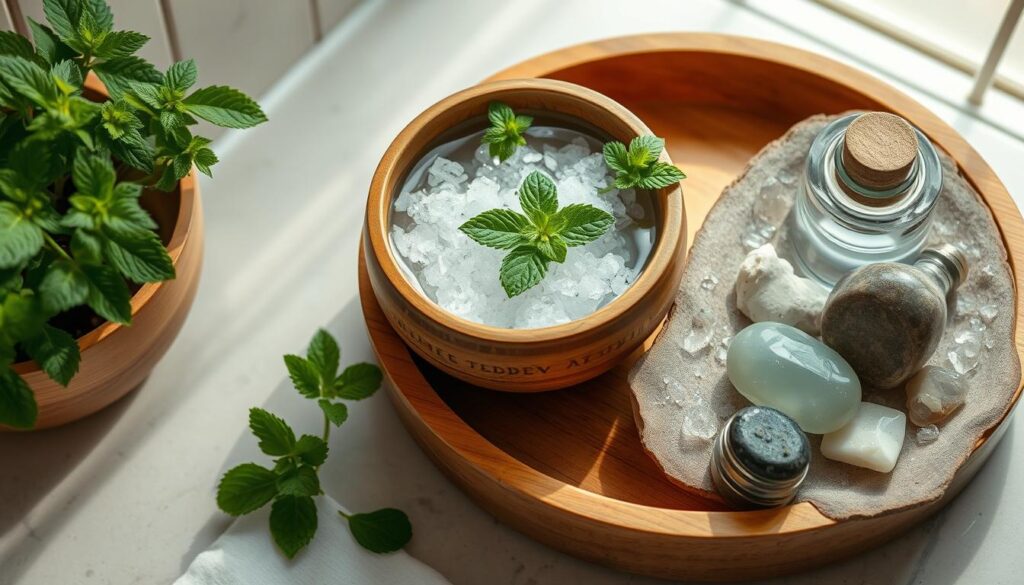It is hard to live with sensitive teeth, BUT there is a light at the end of the tunnel. Natural Ways And Home Remedies Available For Tooth Sensitivity This post highlights the work of essential oils,herbal remedies, diet changes and mineral remedies. You can include these methods to your daily schedule.
Key Takeaways
- Discover the underlying causes and symptoms of tooth sensitivity
- Explore the use of essential oils and herbal remedies for dental care
- Learn about dietary changes that can help reduce teeth sensitivity
- Understand the benefits of natural desensitizing methods using kitchen ingredients
- Implement lifestyle changes to protect your sensitive teeth long-term
Understanding Tooth Sensitivity: Causes and Symptoms
Sensitive teeth can be a real pain. But knowing why it happens is the first step to feeling better. Tooth sensitivity usually comes from worn-down enamel or gums pulling back, exposing the dentin and its nerves.
Common Triggers of Tooth Sensitivity
Some foods and drinks can make your teeth hurt. Hot, cold, acidic, and sweet items are big offenders. Brushing too hard or using a rough toothbrush can also hurt your teeth by wearing down the enamel.
Signs You Have Sensitive Teeth
- Sudden, sharp pain when eating hot, cold, or acidic foods and drinks
- Discomfort when brushing or flossing certain areas of the mouth
- Increased sensitivity to changes in temperature or pressure
The Science Behind Tooth Sensitivity
Tooth sensitivity happens when the dentin, the tooth’s inner layer, gets exposed. Dentin has tiny tubules that connect to the tooth’s nerves. This can cause pain when something outside touches them. This can happen from enamel wear, gum recession, or dental work that removes enamel or gum.
“Understanding the underlying causes of tooth sensitivity is the first step toward finding effective relief and protecting your dental health.”
Essential Oil Solutions for Tooth Sensitivity
Looking for natural ways to ease tooth sensitivity? Essential oils might be the answer. These plant extracts are packed with power to help with tooth pain. Let’s dive into the benefits of some essential oils and how to use them in your dental care.
Clove Oil: Clove oil has been used for ages to treat toothaches and gum issues. Its main ingredient, eugenol, helps with pain and swelling. Use a cotton swab with a bit of diluted clove oil for quick relief.
Peppermint Oil: Peppermint oil’s cool feeling can ease sensitive teeth. It also fights bacteria, keeping your mouth clean and preventing more sensitivity. Mix peppermint oil into your toothpaste or use it as a mouthwash for a fresh, soothing experience.
Tea Tree Oil: Tea tree oil is great for fighting germs and swelling. Mix a few drops with coconut or olive oil and apply it to sensitive teeth with a cotton swab. It helps reduce swelling and aids in healing.
“Essential oils offer a natural and holistic approach to managing tooth sensitivity, providing relief without the potential side effects of over-the-counter medications.”
When using essential oils for your teeth, safety is key. Always dilute them first and never swallow. If you’re unsure or have ongoing sensitivity, talk to your dentist. Adding essential oils to your oral care can be a gentle, effective way to ease tooth sensitivity and improve your dental health.
Herbal Remedies and Natural Treatments for Sensitive Teeth
If you’re looking for natural ways to ease your sensitive teeth, herbal remedies might help. Herbs like chamomile and green tea have properties that can soothe your teeth. They can make your teeth feel less sensitive.
Effective Herbs for Dental Care
- Chamomile: Known for its calming and anti-inflammatory properties, chamomile can help reduce sensitivity and promote healthy gums.
- Green Tea: The polyphenols in green tea have been shown to possess anti-bacterial and anti-inflammatory effects, making it a valuable ally in oral hygiene.
- Licorice Root: This versatile herb contains compounds that can help strengthen enamel and inhibit the growth of harmful bacteria in the mouth.
How to Prepare Herbal Mouth Rinses
Making your own herbal mouth rinses at home is easy and natural. Mix herbs like peppermint, sage, and ginger in hot water. Let it cool before using it as a rinse. It’s refreshing and soothing.
Natural Pastes and Applications
You can also use natural pastes and applications for sensitive teeth. Aloe vera gel can soothe inflammation. A turmeric paste can offer anti-inflammatory benefits and help reduce discomfort.
Adding these herbal remedies and natural treatments to your oral care routine can be gentle and effective. They help manage natural remedies for sensitive teeth and improve dental health. Always talk to your dentist if your sensitivity doesn’t go away.
Dietary Changes That Help Reduce Teeth Sensitivity
Eating a teeth-friendly diet is key to handling sensitive teeth. Focus on foods that strengthen enamel and boost oral wellness. You’ll find great teeth sensitivity solutions in your kitchen.
Dairy products are top picks for foods for sensitive teeth. Milk, cheese, and yogurt are full of calcium and phosphorus. These nutrients make enamel stronger and lower sensitivity risk. Adding these dairy-based foods to your diet can greatly improve your dental health.
Leafy greens like spinach and kale are also good for sensitive teeth. These nutrient-dense vegetables have vitamins and minerals, including vitamin K. Vitamin K helps keep teeth strong and healthy.
But, it’s also key to know what to avoid. Foods and drinks high in acid, like citrus fruits and sugary drinks, can harm enamel and make sensitivity worse. Choosing your food wisely can help reduce teeth sensitivity and improve dental wellness.
| Best Foods for Sensitive Teeth | Foods to Avoid |
|---|---|
|
|
By choosing the right foods and avoiding bad ones, you can manage teeth sensitivity well. This helps keep your teeth healthy for a long time.
Sensitive Teeth Relief: Natural Ways to Treat Sensitive Teeth at Home
Dealing with sensitive teeth can be uncomfortable. But, there are natural remedies you can try at home for relief. These quick fixes and long-term solutions can greatly improve your oral health and comfort.
Quick Relief Methods
For immediate relief from sensitive teeth pain, try these simple natural solutions:
- Swish with a warm salt water rinse to soothe and reduce inflammation.
- Apply a cold compress or ice pack to the affected area to numb the pain.
- Use a toothpaste formulated for sensitive teeth to help block pain signals.
Long-term Natural Solutions
To address the root cause of sensitive teeth and find lasting relief, consider these effective home remedies:
- Practice oil pulling with coconut oil to remove bacteria and remineralize enamel.
- Make a paste with baking soda and water to gently scrub and strengthen teeth.
- Incorporate turmeric into your dental routine to reduce inflammation and pain.
Prevention Tips
Taking proactive steps to maintain good oral hygiene and protect your teeth can help prevent sensitive teeth. Try these natural prevention methods:
- Use a soft-bristled toothbrush and brush gently to avoid damaging enamel.
- Consume a diet rich in tooth-friendly nutrients like calcium, vitamin D, and magnesium.
- Limit acidic and sugary foods that can weaken enamel and contribute to sensitivity.
By incorporating these effective home remedies and prevention techniques, you can find natural ways to treat sensitive teeth. Enjoy a more comfortable, healthy smile.
Salt Water and Mineral-Based Treatments
Looking for natural ways to treat sensitive teeth at home? Salt water and mineral-based treatments are great options. They can help with tooth sensitivity and improve your dental health.
The Benefits of Salt Water Rinses
Salt water rinses are a classic remedy for sensitive teeth. Salt’s antibacterial properties reduce inflammation and soothe gums. It also cleanses your mouth and kills bacteria. To use, mix a teaspoon of salt in a cup of warm water. Swish it around your mouth for 30 seconds, then spit it out.
Baking Soda for Sensitive Teeth
Baking soda is a kitchen item with dental benefits. When mixed with water, it can desensitize teeth and neutralize acid. Make a paste with baking soda and water. Apply it to your teeth with a soft-bristled toothbrush, let it sit, then rinse well.
Mineral-Rich Clay Treatments
Mineral-rich clays like bentonite or kaolin can remineralize tooth enamel and reduce sensitivity. Mix clay powder with water to make a paste. Apply it to sensitive teeth, let it sit for 10-15 minutes, then rinse.
Adding salt water, baking soda, and mineral treatments to your oral care routine can help with sensitive teeth. You can find relief and improve your dental health at home.

Natural Desensitizing Methods Using Kitchen Ingredients
Looking for ways to ease sensitive teeth naturally? Your kitchen might have the answer. Household items can offer relief and desensitize teeth without chemicals. Let’s dive into three natural methods using honey, turmeric, and coconut oil.
Honey and Warm Water Solutions
Honey is known for soothing and fighting bacteria, making it great for tooth pain. Mix a teaspoon of raw honey with warm water for a mouthwash. This combo can protect sensitive teeth and gums, feeling comforting.
Turmeric Paste Applications
Turmeric, the bright yellow spice, fights inflammation and eases tooth sensitivity. Make a paste with turmeric and water or coconut oil. Apply it to sensitive teeth for a few minutes before rinsing. Turmeric’s compounds can desensitize teeth and support healthy gums.
Coconut Oil Pulling Benefits
- Coconut oil is great for oral health due to its antibacterial and cleansing properties.
- Try coconut oil pulling by swishing a tablespoon in your mouth for 15-20 minutes, then spit it out.
- This method can cut down on plaque, whiten teeth, and ease sensitivity by removing bad bacteria.
Using these natural methods from your kitchen can gently and effectively ease tooth pain. They promote dental health too.
Lifestyle Changes to Protect Sensitive Teeth
Keeping your teeth healthy is more than just dentist visits. Making lifestyle changes can greatly improve your oral hygiene and protect your teeth. These changes include better brushing habits and managing stress, which can significantly enhance your dental care routine.
Brushing Techniques Matter
Choosing the right brushing method is key to protecting your enamel. Hard-bristled brushes or aggressive scrubbing can harm your teeth, making them more sensitive. Use a soft-bristled brush and brush in gentle, circular motions to clean your teeth effectively.
Regular Dental Check-ups
Regular dentist visits are crucial for your oral health. Your dentist can spot early signs of enamel problems or sensitivity. They can then offer tailored advice for treatment and prevention.
Stress and Oral Health
Stress can significantly affect your dental health. Grinding or clenching your teeth, a stress response, can wear down enamel. Stress management, like meditation or yoga, can help prevent this and protect your teeth.
By adopting these lifestyle changes, you can actively maintain your teeth’s health. This reduces sensitivity and promotes better oral hygiene in the long run.

| Habit to Avoid | Impact on Sensitive Teeth |
|---|---|
| Aggressive Brushing | Damages tooth enamel, exacerbating sensitivity |
| Teeth Grinding (Bruxism) | Wears down enamel, leading to increased sensitivity |
| Consuming Acidic Foods/Drinks | Erodes enamel, making teeth more susceptible to pain |
Essential Vitamins and Minerals for Tooth Health
Keeping your teeth strong is key for your wellness. Good nutrition is vital for this. We’ll look at the main enamel protection nutrients and where to find them. This will help you take care of your teeth better.
Key Nutrients for Enamel Strength
Calcium, vitamin D, and phosphorus are crucial for strong teeth. Calcium builds and keeps teeth strong. Vitamin D helps your body use calcium well. Phosphorus works with calcium to keep enamel strong.
Natural Sources of Dental-Friendly Nutrients
- Dairy products, like milk, yogurt, and cheese, are rich in calcium and phosphorus.
- Fatty fish, like salmon and tuna, provide a valuable source of vitamin D.
- Leafy greens, nuts, and beans are excellent plant-based options for obtaining these essential nutrients.
- Incorporating a variety of these wellness-promoting foods into your diet can help strengthen your teeth and reduce sensitivity.
| Nutrient | Function | Natural Sources |
|---|---|---|
| Calcium | Builds and maintains tooth structure | Dairy, leafy greens, beans, almonds |
| Vitamin D | Facilitates calcium absorption | Fatty fish, egg yolks, fortified foods |
| Phosphorus | Works with calcium to support enamel | Dairy, meat, poultry, fish, nuts, seeds |
Adding these enamel protection nutrients to your daily routine can strengthen your teeth. It also helps reduce sensitivity. This promotes long-term wellness.
Conclusion
The natural world has many ways to ease the pain of sensitive teeth. We’ve looked at essential oils, herbal remedies, diet changes, and lifestyle tips. These natural ways to treat sensitive teeth at home can help you feel better and keep your teeth healthy for a long time.
While these natural methods work well, seeing a dentist is key for ongoing tooth sensitivity. They can find the real cause and give advice tailored just for you. Mixing natural remedies with dental care helps keep your teeth and smile healthy.
Your dental health is very important. Using natural ways to treat sensitive teeth at home is a big step towards feeling better and being healthy. Let nature help you take care of your teeth today.
Additional Resources for Sensitive Teeth Remedies
If you’re seeking more in-depth information about natural remedies for sensitive teeth, consider visiting these trusted sources:
American Dental Association (ADA) – The ADA provides valuable insights into dental health, including tips on managing tooth sensitivity. You can explore their resources here.
Mayo Clinic – Known for its expert medical advice, the Mayo Clinic offers a comprehensive overview of tooth sensitivity, including causes and treatment options. Check out their article here.
Healthline – Healthline covers a range of health topics, including natural remedies for sensitive teeth. Their article provides practical tips and solutions that may help alleviate discomfort. Read more here.
WebMD – WebMD is a well-respected resource for health information. They have a section dedicated to oral health that discusses sensitivity and natural treatment methods. Visit their site here.
Cleveland Clinic – This nonprofit academic medical center offers a wealth of information on dental care, including management of sensitive teeth. Explore their expert insights here.
FAQ
What are the common causes of tooth sensitivity?
Tooth sensitivity can come from several sources. Enamel erosion, gum recession, and dental work that exposes dentin are common causes. Eating or drinking hot, cold, acidic, or sweet things can also trigger it.
How can essential oils help relieve sensitive teeth?
Essential oils like clove, peppermint, and tea tree oil can help. They have natural pain-relieving and anti-inflammatory effects. You can apply them directly or mix them into homemade mouthwashes for relief.
What herbal remedies are effective for treating sensitive teeth?
Herbs like chamomile, green tea, and licorice root can help. They can be used in mouth rinses or natural pastes. These can ease tooth sensitivity and support your mouth’s health.
How can dietary changes help reduce tooth sensitivity?
Eating foods high in calcium and phosphorus can help. Dairy, leafy greens, and crunchy fruits and veggies are good choices. They can strengthen your teeth and reduce sensitivity.
What are some quick relief methods for sensitive teeth?
For quick relief, try rinsing with warm salt water or applying a cold compress. Using a desensitizing toothpaste can also help. These methods can offer temporary relief while you work on the underlying cause.
How can natural ingredients like honey and turmeric help with sensitive teeth?
Honey’s antimicrobial and anti-inflammatory properties can soothe sensitive teeth. Turmeric paste can also help reduce discomfort. These kitchen items can be effective home remedies for sensitive teeth.
What lifestyle changes can help protect sensitive teeth?
Good brushing habits and avoiding too much acidic food and drink are key. Managing stress and regular dental visits are also important. These steps can help keep your teeth and gums healthy.
What vitamins and minerals are important for tooth health?
Calcium, vitamin D, and phosphorus are crucial for strong teeth. A diet rich in these nutrients can support your oral health. They help prevent sensitivity and strengthen tooth enamel.
